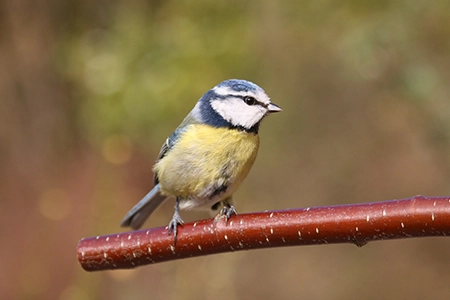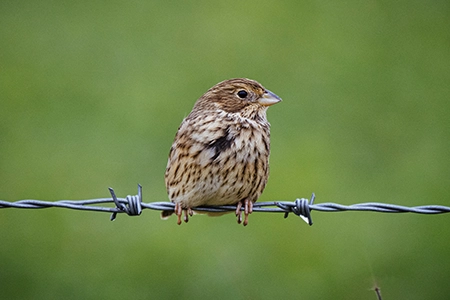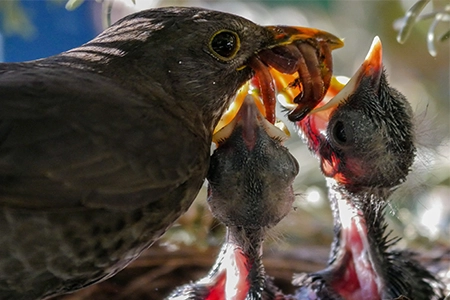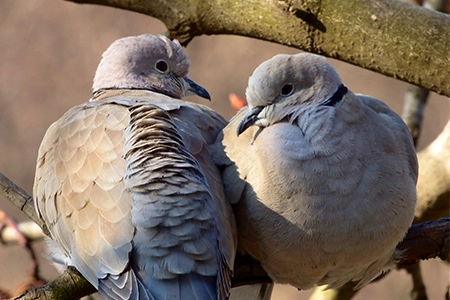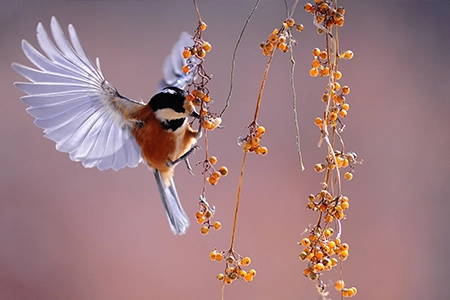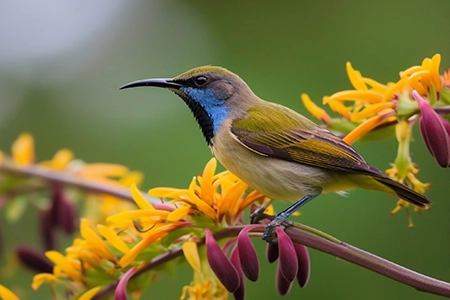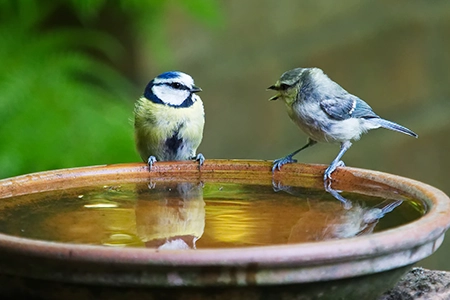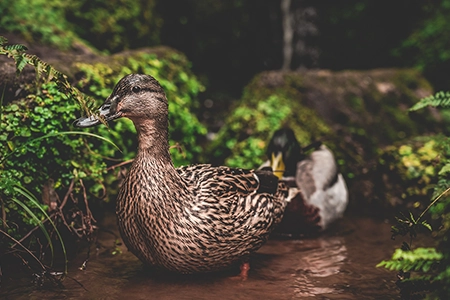Introduction
Embracing the harmonious melodies and stunning hues of birds in your garden not only enriches your outdoor experience but also fosters a deeper connection with the natural world. In this article, we’ll delve into the profound significance of inviting birds into your garden sanctuary.
We’ll emphasise the pivotal role of bird-friendly plants in cultivating a hospitable environment for our avian companions, offering insights into the selection and cultivation of these essential elements of a thriving ecosystem. Join us as we embark on a journey to discover the wonders of bird-friendly plants and create a haven where nature’s winged wonders can flourish.
Inviting Birds into your Garden with Bird-Friendly Plants
Bringing nature into our gardens isn’t just about aesthetics; it’s about nurturing a dynamic and interconnected ecosystem that benefits both humans and wildlife alike. Birds, in particular, serve as nature’s custodians, performing crucial ecological functions that sustain the health and vitality of local ecosystems. From controlling insect populations to dispersing seeds and pollinating plants, these feathered allies are indispensable contributors to the intricate web of life.
By cultivating a bird-friendly environment enriched with diverse vegetation, including bird-friendly plants, we create a sanctuary where these avian inhabitants can thrive. Bird-friendly plants provide essential food sources, shelter, and nesting sites, ensuring that our garden serves as a vital refuge for birds throughout the year. In doing so, we not only enhance the beauty of our outdoor space but also play a proactive role in supporting biodiversity and ecological resilience on a local scale.
Birds in the Food Chain within the UK
In the intricate web of life, birds occupy a crucial position in the food chain, serving as both predators and prey. As predators, birds play a pivotal role in controlling insect populations, acting as natural pest control agents that help prevent outbreaks of pests which could otherwise devastate crops and gardens. From feasting on harmful insects like aphids and caterpillars to controlling populations of rodents and small mammals, birds contribute significantly to maintaining the health of ecosystems.
Additionally, birds serve as vital prey for larger predators, including mammals like foxes and birds of prey such as owls and hawks. By serving as a food source for these apex predators, birds play a fundamental role in sustaining the populations of carnivores and maintaining the balance of predator-prey dynamics within ecosystems.
Furthermore, birds contribute to the dispersal of seeds and pollen, facilitating the reproduction and regeneration of plant species. Their foraging behaviours and long-distance migrations help transport seeds over vast distances, aiding in the colonisation of new habitats and contributing to the genetic diversity of plant populations.
Overall, the presence of birds in the ecosystem is essential for maintaining ecological balance, promoting biodiversity, and ensuring the resilience of natural communities. Protecting and conserving bird populations is not only crucial for their own survival but also for the health and stability of entire ecosystems.
Endangered UK Species in need of Bird-Friendly Plants
In the United Kingdom, several bird species are facing significant threats to their survival due to various factors, including habitat loss, pollution, and climate change. Among these endangered species are the Eurasian Curlew, the Turtle Dove, the Scottish Crossbill, the Corn Bunting, and the Willow Tit. These birds are particularly vulnerable due to declining populations and diminishing habitats, making conservation efforts crucial for their survival.
To support the recovery of these endangered bird species, it’s essential to create habitats that provide suitable nesting sites, food sources, and shelter. Planting bird-friendly plants native to the UK can play a vital role in this effort. Species such as hawthorn, elderberry, oak, rowan, and birch are not only valuable food sources for birds but also provide essential habitat components like nesting sites and cover from predators.
By incorporating these bird-friendly plants into gardens, parks, and natural landscapes, individuals can contribute to the conservation of endangered bird species in the UK. These plants not only enhance the aesthetic appeal of outdoor spaces but also serve as vital resources for threatened bird populations, helping to ensure their long-term survival and biodiversity conservation.
5 Bird-Friendly Plants that Provide a Food Source
Providing a diverse array of bird-friendly plants in your garden can significantly contribute to supporting native bird populations by offering a readily available food source throughout the year.
Sunflowers
Sunflowers are renowned for their large, vibrant blooms and nutritious seeds, making them a favourite among many bird species. Finches, sparrows, and chickadees are particularly fond of sunflower seeds, making them a valuable addition to any bird-friendly garden.
Berries
Plants like elderberry, holly, and blackberry produce an abundance of berries that birds love to feast on. These berries are rich in essential nutrients and provide birds with much-needed sustenance, especially during the winter months when food sources may be scarce.
Native Grasses
Native grasses such as fescue and bluegrass not only add texture and visual interest to the landscape but also produce seeds that attract ground-feeding birds like sparrows and juncos. By incorporating native grasses into your garden, you can create a habitat that supports a diverse range of bird species.
Fruit Trees
Fruit-bearing trees such as apple, pear, and cherry not only provide delicious treats for humans but also offer abundant food for birds. These trees attract a variety of bird species, ranging from songbirds to woodpeckers, and provide essential sustenance throughout the year.
Insect-Friendly Plants
Plants like lavender, heather, and thyme not only attract pollinators like bees and butterflies but also provide a valuable food source for insect-eating birds like warblers and flycatchers. By cultivating these plants in your garden, you can help sustain local bird populations by supporting their natural diet of insects.
By incorporating these bird-friendly plants into your garden, you can create a welcoming habitat that not only attracts birds but also supports their nutritional needs, helping to promote biodiversity and conservation efforts.
5 Bird-Friendly Plants that Provide Nesting Materials
In addition to providing food sources, incorporating plants into your garden that offer nesting materials is crucial for supporting native bird populations, especially during the breeding season.
Pussy Willow
The soft, fuzzy catkins of pussy willow are not only charming to behold but also serve as ideal nesting materials for birds like blue tits and long-tailed tits. These birds use the fluffy fibres to line their nests, providing insulation and comfort for their eggs and hatchlings.
Grasses and Reeds
Plants such as pampas grass, reed grass, and bulrushes offer sturdy materials for building nests and shelter for nesting birds. These grasses provide structural support for nests and help create a safe and secure environment for breeding and raising young.
Moss
Mosses growing on rocks and trees offer soft, insulating material for lining bird nests, helping to keep eggs and hatchlings warm and protected. Birds like wrens and robins often incorporate moss into their nests, providing a cosy nesting environment for their offspring.
Twigs and Small Branches
Trees and shrubs that shed small twigs and branches, such as birch and willow, provide essential nesting materials for many bird species. These twigs are used by birds to construct the framework of their nests, providing stability and structure.
Honeysuckle
The flexible stems of honeysuckle vines make excellent nesting material for birds, allowing them to weave and shape the branches into sturdy structures. Additionally, the fragrant flowers of honeysuckle attract insects, providing a food source for nesting birds and enhancing the overall biodiversity of the garden.
Features to Entice Birds into Your Garden
Enhancing your garden with features specifically designed to attract and support birds can further elevate the appeal of your outdoor space while providing essential resources for avian visitors.
Bird Feeders
Installing bird feeders filled with a variety of seeds, nuts, and suet is an effective way to attract a diverse array of bird species to your garden. Different birds have varying dietary preferences, so offering a selection of food ensures that you cater to the needs of various feathered visitors. Additionally, placing feeders strategically throughout your garden encourages birds to explore different areas, increasing the likelihood of sightings.
Birdhouses
Providing birdhouses or nesting boxes offers birds safe and secure sites for breeding and raising their young. These structures mimic natural nesting cavities and can attract cavity-nesting species such as bluebirds, chickadees, and wrens. When selecting or building birdhouses, consider the preferences of specific bird species and ensure that the dimensions and entrance hole sizes are appropriate for their needs.
Native Trees and Shrubs
Incorporating native trees and shrubs into your garden not only provides food and shelter for birds but also enhances the overall biodiversity of your landscape. Native plants are adapted to the local climate and soil conditions, making them well-suited for supporting native bird species. Choose bird-friendly plants that produce berries, seeds, or nectar, and opt for a variety of species to attract a diverse range of birds throughout the year.
To read more about what is classified as a Native UK plant visit our blog article which gives an in-depth depiction of the complexities of using the word ‘Native’ concerning UK botany.
Bird Baths
Access to clean water is essential for birds, especially during hot weather or periods of drought. Installing a bird bath in your garden provides birds with a reliable source of water for drinking and bathing, promoting their health and well-being. Choose shallow, sturdy birdbaths with sloping edges to accommodate birds of different sizes and ensure easy access. Regularly clean and replenish the water to maintain hygiene and freshness.
By including bird-friendly plants and features in your garden design, you can create a welcoming haven for birds while adding beauty, biodiversity, and vitality to your outdoor space. Observing and interacting with these feathered visitors adds a delightful dimension to gardening and fosters a deeper connection with the natural world.
How NGS Can Help with Bird-Friendly Gardens
At NGS, we recognise the pivotal role that gardens play in fostering biodiversity and supporting local wildlife, particularly birds. Our team of expert garden designers is dedicated to crafting outdoor spaces that serve as thriving habitats for feathered friends. By strategically selecting bird-friendly plants native to the region, we ensure that your garden provides essential food sources and shelter for birds throughout the year.
Incorporating a diverse array of bird-friendly plants into your garden design not only enhances its aesthetic appeal but also contributes to the health and well-being of local bird populations. From flowering shrubs that attract pollinators to berry-bearing trees that provide nourishment, our tailored approach to plant selection prioritises the needs of avian visitors.
In addition to integrating bird-friendly plants, we can incorporate purpose-built features such as bird feeders, birdhouses, and bird baths seamlessly into your garden landscape. These elements not only enhance the functionality of your outdoor space but also create inviting opportunities for birds to feed, nest, and bathe.
To find out more about how we can help you install a garden that includes bird-friendly plants get in touch via our Contact Us page.
Conclusion
By embracing bird-friendly gardening practices and selecting plants that provide food, shelter, and nesting materials, you can transform your garden into a haven for native bird species. By inviting birds into your outdoor space, you’ll not only enhance the beauty of your garden but also contribute to the preservation of biodiversity and the health of local ecosystems. Embrace the joy of birdwatching and the wonder of nature as you cultivate a thriving habitat for our feathered friends.

